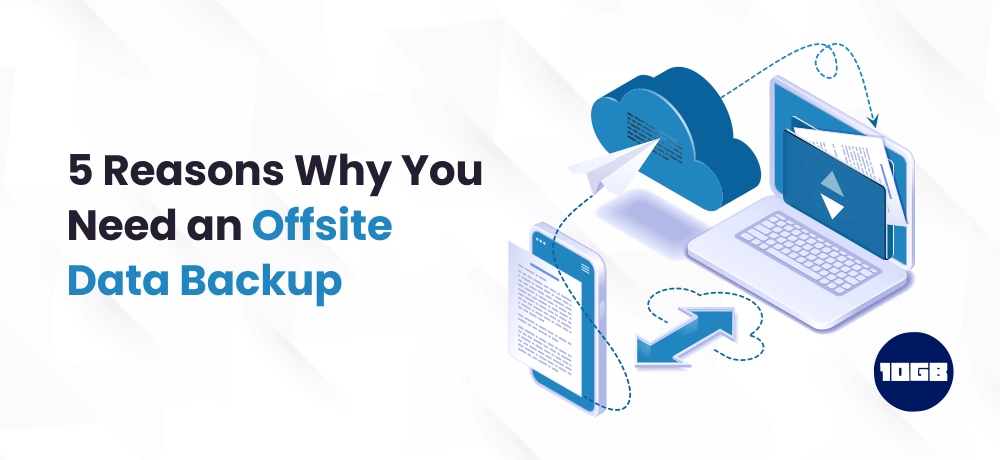Are you looking to figure out what offsite data backups are and how off-server data backups work?
We are residing in a world where things don’t go as per our plan. More often, events could be catastrophic to your business or your business’s data.
Businesses must ensure that they implement a plan to safeguard the data against breaches and natural catastrophes.
Here’s when an offsite data backup comes to the rescue.
So, with this article, we will delve deep to see what offsite backups are, how they work and how they can help your business prosper.
Table of Contents
What are Offsite Data Backups?
Offsite backup is one method of safeguarding data to a server or media into a distinct location than the primary server.
Local backups stored on your server’s hard drive can prove to be beneficial when small issues occur. For instance, when just a single file gets corrupted, backups stored on the server can quickly restore those files. However, with offline backups, you get a higher level of guarantee as in case the whole server gets corrupt, you won’t have a backup to restore. This is one of the reasons why you need offsite data backups to keep your data safe and sound.
Also Read: How To Perform WordPress Database Backup Manually?
How Do Offsite Backups Work?
There are numerous methods to deploy offsite backups. Basically, the software is used to either sync data or take a snapshot to treat as a backup. Then, data is encrypted and compressed before it is finally sent to a secure storage location.
Additionally, there are few solutions that provide the capability to incrementally back up your information while saving just the changes to your file system. Offering this kind of service enables multiple recovery restore points.
Most hosting providers, like 10GB hosting offer backup and support solutions to easily manage your data which you can stay stress-free.
Why Should Backup Media be Stored Offsite?
For those who are thinking about why you need an offsite data backup or why should backup media be stored offsite?: here are the top five reasons:
Save Primary Storage Space while Achieving Optimal Server Performance
Regardless of whether your infrastructure is at your business place or with a hosting provider, primary space can be quite limited for those who have a single storage volume and no backup drive. You need to preserve space to host your future projects.
While you do offsite data backup, you can save primary drive storage space which keeping your server running ideally. Preserving some space for your OS and critical files permits everything to run smoothly without having to reserve that space for data backups.
Moreover, you can cut the cost of data backups while you do an offsite backup.
Protects Your Data From an Onsite Location Disaster
In the case of in-house hosting (hosting their infrastructure at their place), there is always a possibility that some kind of unexpected catastrophe could happen, such as a flood, fire, earthquake, or hurricane. It is of utmost importance that you prepare for these eventualities. So, ensure that your store your backup in an isolated, secure and accessible environment.
You should look for a managed hosting provider while you face difficulties in setting up infrastructure at another location.
With offsite backups in place, you will have peace of mind knowing that you can easily restore your server in case of disaster.
Protection Against Comprehensive System Crash
One of the main reasons why backup media should be stored offsite is because you will have a reserve backup in case of a comprehensive system crash. In short, you won’t have to experience failure in system software, database server, and the webserver. Having appropriate safety measures (offsite data backup) in place can help save your time, money, and even your business.
Gives Assurance in the Event of Hard Drive Failure
System crashes aren’t solely a threat to data integrity. Even hardware failure, a hard drive failure to be precise, results in loss of data and costly downtime. Hard drives don’t last long. While SSD drives have a better lifespan than conventional hard disk drives, they still have a definite number of reads and writes. While you perform offsite data backups, you are eliminating the risks of hard drive failure.
Though in some cases data retrieval from a failed drive is a possibility, the time, the efforts, and the high costs involved in the process of data retrieval don’t make it practical.
Data retrieval from failed drives can be sent to companies having specialization in data recovery, which is usually complex and costly, and most of the IT staff don’t have the skills to perform data recovery.
Recourse in the Event of Data Breach
A data breach occurs due to illegitimate access to sensitive or confidential data. These days, data breaches are quite common, you can find news on the internet regarding data breaches.
Data security and backups have become quite important in the current date. Having offsite data backups allows you to restore with a clean, uninfected copy of your data.
Conclusion
Offsite data backups offer protection against unexpected eventualities, preserve primary storage space, offer protection against comprehensive system crashes or hardware failure.
Regardless of which of these you are solving for, the ideal offsite backup solution is deserving and gives you peace of mind.
If you are tight on budget but need the functionalities of a dedicated server? Kindly check out our Managed VPS UK plan
